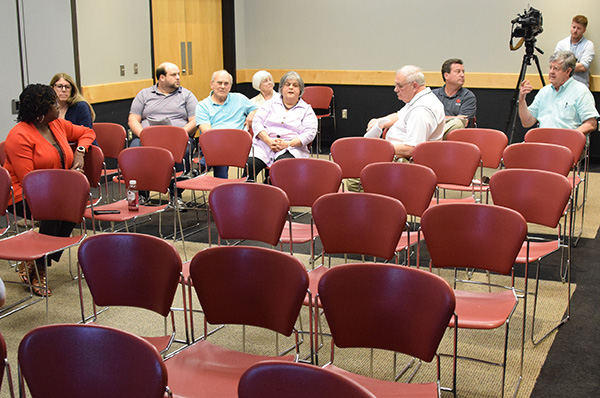Judging by the public response at the “Drop-In” session on the proposed Good Repair Ordinance on Wednesday, May 15 at the Central Library, the people of Greensboro are not in favor of the ordinance by a wide margin. Of the ten folks who showed up eight were against the ordinance to varying degrees, one was in favor and one was on the fence.
If the City Council is paying attention to what the citizens want, at the public hearing on this proposed ordinance 80 percent of the people who were interested enough to attend, were opposed.
The one person in favor, Bob Kollar, has been a member of the Minimum Housing Standards Commission for 14 years said he has never been involved in a small business. The Minimum Housing Standards Commission will be the body that makes rulings on the inspections if the ordinance passes.
Unless the city schedules another public hearing this was the first and only opportunity the public will have to speak on the ordinance until the night it comes up on the City Council agenda.
It should be noted that this was not a drop-in session as advertised, but more of a public hearing where people asked questions and city staff answered. Assistant City Manager Barbara Harris answered most of the questions. Assistant City Attorney Terry Jones answered questions about the legal aspects of the ordinance and Neighborhood Development Director Stan Wilson answered questions about how the ordinance would be implemented.
Wilson said that the first year hiring two new inspectors would cost the city about $350,000, but that included one time expenses like buying cars and computers for the two inspectors.
Some of the folks against the ordinance were adamantly against it. The first person to speak was Wayne Atwood who said, “Let’s get rid of the whole thing.” And to demonstrate how he felt about it, Atwood tore the copy of the ordinance he had been given in half.
Atwood said that the ordinance would drive small businesses out of business and force them to sell their property.
Charles Miller who owns the Miller Furniture building on South Elm Street said, “I’m a property owner downtown and probably the main target.”
Miller is right. His property is one of the main targets of the ordinance which is why the City Council originally wanted to have the “Good Repair Ordinance” apply only to the downtown. However, the city doesn’t have the authority to discriminate against property owners in one part of town with an onerous building inspection ordinance without having the state legislature pass a bill, giving the City of Greensboro that power. The City Council doesn’t have anyone in the legislature who could push such a bill through. So the fall back position was to make the ordinance citywide.
But having a local bill passed so that the good repair ordinance would apply only to the downtown is on the legislative agenda which the City Council passed and then held a meeting to discuss with the Guilford County Legislative Delegation. Now the City Council appears to be supporting a citywide ordinance, but that was not the Council’s intent in February.
Miller said that the city had lots of money to spend on manufacturing outside the city limits, but he was told nothing to spend to help establish retail downtown.
He said that the buildings the city was concerned about “would be well maintained if they were occupied,” but that the city offers no help for the property owners.
Miller said, “When I hear search warrants I think Gestapo.”
Both Miller and Atwood said they had potential renters that they lost to Winston-Salem because Winston was more accommodating.
Atwood said, “It’s a systemic problem that has grown over the past 50 years.”
He said, “We’re getting drowned in ordinances.”
There were a number of questions asked about how the inspections would be handled and when they were told that an anonymous complaint could start the inspection process, those in attendance were not pleased.
Several people also said that it appeared the goal of the ordinance was to drive the small business owners out of business.
Kollar asked if small business owners were consulted before the ordinance was written.
Harris said that they were not. She said that the city staff was solely responsible for the ordinance.
In answer to another question it was revealed that the city has no idea how many buildings are out of compliance with the proposed ordinance or how many will be inspected.
One man in the commercial real estate business said that there wasn’t a building in Greensboro that could meet the standards in the International Property Maintenance Code (IPMC) which is what the Good Repair Ordinance is designed to enforce. Another said that a person would have to have a Ph.D. to understand the IPMC.
Harris invited everyone to come to the City Council meeting on Tuesday, June 18 to express their views. The consensus of those in the room was that the City Council would have already made up its mind at that point and to come speak at the public hearing directly before the vote would be fruitless.
Councilmembers Tammi Thurm and Marikay Abuzuaiter were in the room before the meeting started, but left shortly after people started asking questions.
Before the meeting Thurm said, “I’m in favor of it. I’ll be voting for it.”


The city council, with its anti-business attitude, will reap what they sow…Driving businesses out of the city one by one until they sit and scratch their heads collectively. Then they will demand answers from some poor economic development person and probably demand that they be fired because of lack of business. Foolish Draconian ordinances enacted by foolish people who have never owned or business but think they know what’s best. It should speak volumes that not a single business owner was asked for input.